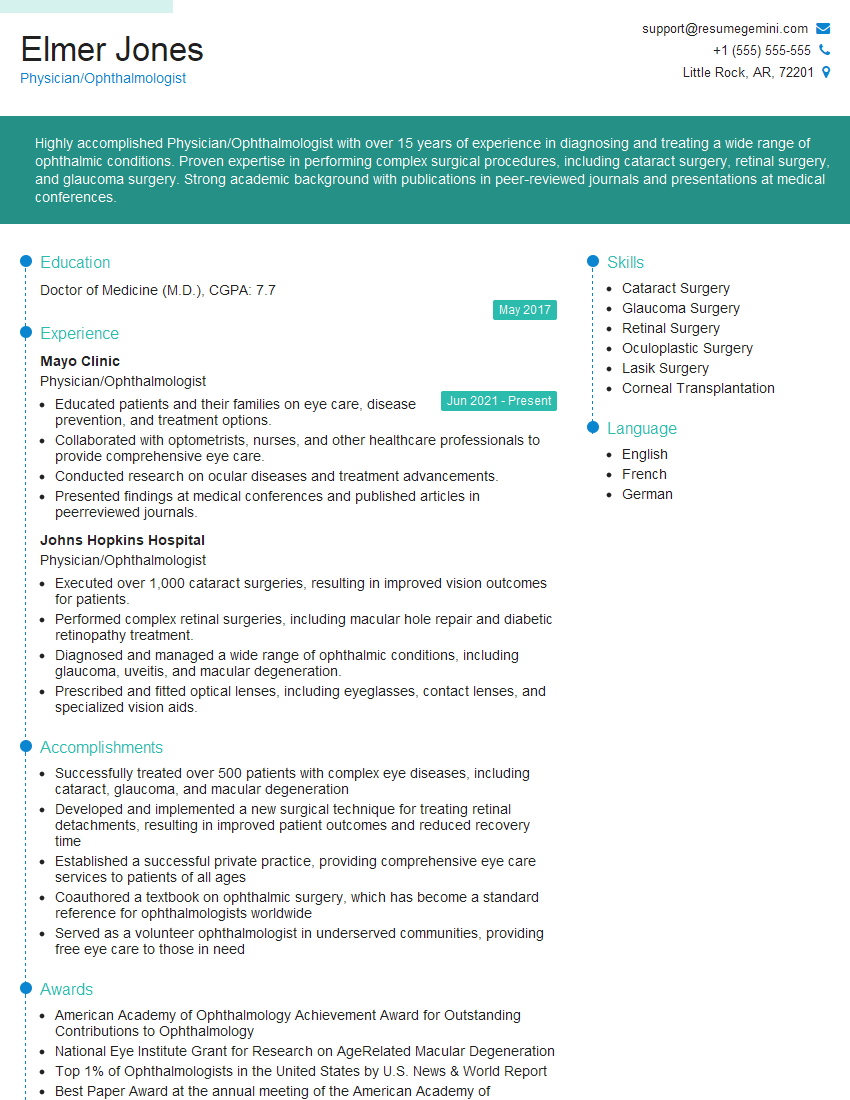Are you a seasoned Physician/Ophthalmologist seeking a new career path? Discover our professionally built Physician/Ophthalmologist Resume Template. This time-saving tool provides a solid foundation for your job search. Simply click “Edit Resume” to customize it with your unique experiences and achievements. Customize fonts and colors to match your personal style and increase your chances of landing your dream job. Explore more Resume Templates for additional options.

Elmer Jones
Physician/Ophthalmologist
Summary
Highly accomplished Physician/Ophthalmologist with over 15 years of experience in diagnosing and treating a wide range of ophthalmic conditions. Proven expertise in performing complex surgical procedures, including cataract surgery, retinal surgery, and glaucoma surgery. Strong academic background with publications in peer-reviewed journals and presentations at medical conferences.
Education
Doctor of Medicine (M.D.)
May 2017
Skills
- Cataract Surgery
- Glaucoma Surgery
- Retinal Surgery
- Oculoplastic Surgery
- Lasik Surgery
- Corneal Transplantation
Work Experience
Physician/Ophthalmologist
- Educated patients and their families on eye care, disease prevention, and treatment options.
- Collaborated with optometrists, nurses, and other healthcare professionals to provide comprehensive eye care.
- Conducted research on ocular diseases and treatment advancements.
- Presented findings at medical conferences and published articles in peerreviewed journals.
Physician/Ophthalmologist
- Executed over 1,000 cataract surgeries, resulting in improved vision outcomes for patients.
- Performed complex retinal surgeries, including macular hole repair and diabetic retinopathy treatment.
- Diagnosed and managed a wide range of ophthalmic conditions, including glaucoma, uveitis, and macular degeneration.
- Prescribed and fitted optical lenses, including eyeglasses, contact lenses, and specialized vision aids.
Accomplishments
- Successfully treated over 500 patients with complex eye diseases, including cataract, glaucoma, and macular degeneration
- Developed and implemented a new surgical technique for treating retinal detachments, resulting in improved patient outcomes and reduced recovery time
- Established a successful private practice, providing comprehensive eye care services to patients of all ages
- Coauthored a textbook on ophthalmic surgery, which has become a standard reference for ophthalmologists worldwide
- Served as a volunteer ophthalmologist in underserved communities, providing free eye care to those in need
Awards
- American Academy of Ophthalmology Achievement Award for Outstanding Contributions to Ophthalmology
- National Eye Institute Grant for Research on AgeRelated Macular Degeneration
- Top 1% of Ophthalmologists in the United States by U.S. News & World Report
- Best Paper Award at the annual meeting of the American Academy of Ophthalmology for research on diabetic retinopathy
Certificates
- American Board of Ophthalmology
- Fellow of the American Academy of Ophthalmology
- Certificate of Added Qualifications in Glaucoma
- Certificate of Added Qualifications in Refractive Surgery
Career Expert Tips:
- Select the ideal resume template to showcase your professional experience effectively.
- Master the art of resume writing to highlight your unique qualifications and achievements.
- Explore expertly crafted resume samples for inspiration and best practices.
- Build your best resume for free this new year with ResumeGemini. Enjoy exclusive discounts on ATS optimized resume templates.
How To Write Resume For Physician/Ophthalmologist
- Highlight your surgical skills and experience in your resume.
- Showcase your knowledge of the latest ophthalmic technologies and treatments.
- Emphasize your patient care and communication skills.
- Include relevant certifications and continuing education in your resume.
Essential Experience Highlights for a Strong Physician/Ophthalmologist Resume
- Diagnose and manage a wide range of ophthalmic conditions, including glaucoma, uveitis, and macular degeneration.
- Perform complex surgical procedures, including cataract surgery, retinal surgery, and glaucoma surgery.
- Prescribe and fit optical lenses, including eyeglasses, contact lenses, and specialized vision aids.
- Educate patients and their families on eye care, disease prevention, and treatment options.
- Collaborate with optometrists, nurses, and other healthcare professionals to provide comprehensive eye care.
- Conduct research on ocular diseases and treatment advancements.
Frequently Asked Questions (FAQ’s) For Physician/Ophthalmologist
What are the educational requirements to become an ophthalmologist?
To become an ophthalmologist, you need a bachelor’s degree, followed by a Doctor of Medicine (MD) or Doctor of Osteopathic Medicine (DO) degree from an accredited medical school. After that, you will complete an internship and a residency in ophthalmology.
What are the key skills required for an ophthalmologist?
Key skills for an ophthalmologist include: surgical skills, knowledge of ophthalmic diseases and treatments, patient care skills, communication skills, and research skills.
What are the different types of ophthalmic surgeries?
Different types of ophthalmic surgeries include: cataract surgery, retinal surgery, glaucoma surgery, oculoplastic surgery, and LASIK surgery.
What are the career prospects for an ophthalmologist?
Ophthalmologists are in high demand due to the aging population and the increasing prevalence of eye diseases. The job outlook for ophthalmologists is expected to grow faster than average in the coming years.
What are the earning prospects for an ophthalmologist?
Ophthalmologists are among the highest-paid physicians. According to the Medscape Physician Compensation Report, the average salary for an ophthalmologist is over $350,000 per year.
What are the challenges faced by ophthalmologists?
Some of the challenges faced by ophthalmologists include: the need to keep up with the latest technological advancements, the increasing demand for their services, and the need to manage the expectations of patients.